Adaptogens for Body Dysmorphic Disorder: Rhodiola, Ginseng, and More
Introduction
Body Dysmorphic Disorder (BDD) is a deeply challenging condition that affects far more than self-image—it reshapes how a person perceives themselves, others, and the world. It’s not just about appearance; it’s about how the nervous system responds to stress, how the brain regulates emotion, and how the body maintains balance under pressure.
Chronic anxiety, obsessive thoughts, and emotional exhaustion are hallmarks of BDD. Over time, these drain the brain’s chemical reserves, disrupt hormone rhythms, and weaken resilience. This is where adaptogens—a unique class of plant-based compounds—can play a remarkable supportive role.
Adaptogens don’t “numb” emotions or override the body’s stress system. Instead, they train the body to adapt to stress more efficiently, reducing burnout and restoring equilibrium. Ancient systems like Ayurveda and Traditional Chinese Medicine have used these herbs for centuries to restore inner balance. Modern research now confirms that adaptogens regulate the hypothalamic-pituitary-adrenal (HPA) axis, lower cortisol, and enhance neurotransmitter stability—all of which can benefit those living with BDD.
This article explores how adaptogens like Rhodiola rosea, Panax ginseng, Ashwagandha, and others can help rebalance the mind-body connection, reduce anxiety, and build emotional endurance for long-term healing.
Looking for supplements for This? Click here.
Understanding BDD and the Stress Connection ⚡
For individuals with Body Dysmorphic Disorder, the stress response is chronically activated. Every mirror reflection, comment, or imagined judgment can trigger a fight-or-flight cascade.
This happens because the amygdala (the brain’s fear center) is hypersensitive, while the prefrontal cortex (the reasoning center) struggles to regulate it. This imbalance keeps the body in a state of sympathetic dominance—constantly alert, tense, and flooded with stress hormones like cortisol and adrenaline.
Chronic cortisol elevation doesn’t just create anxiety; it also depletes neurotransmitters like serotonin and dopamine, impairing mood and emotional regulation. Over time, this leads to burnout, fatigue, and increased vulnerability to depression.
Adaptogens help retrain the stress system, teaching it to respond instead of react. They work on both the brain and body, improving energy stability, hormone regulation, and emotional resilience—all crucial for individuals navigating the intensity of BDD.
What Are Adaptogens? 🌿
Adaptogens are a unique class of herbs and mushrooms that help the body adapt to physical and emotional stress without causing sedation or overstimulation.
To qualify as an adaptogen, a plant must:
Reduce the effects of stress on the body and mind.
Support homeostasis—balancing energy, mood, and hormones.
Be non-toxic and non-habit forming even with long-term use.
Adaptogens work primarily through the HPA axis, the body’s main stress-regulation system. By normalizing cortisol output and modulating neurotransmitters like serotonin and GABA, they help prevent the “crash” that follows chronic anxiety or overexertion.
For someone with BDD—where the brain is perpetually in a state of vigilance—adaptogens act as physiological stabilizers, restoring the balance between calm and alertness.
How Adaptogens Affect the Brain 🧬
Adaptogens influence multiple biological systems simultaneously. Their benefits stem from neuroprotective, antioxidant, and anti-inflammatory effects that enhance communication between brain regions involved in emotion regulation.
Specifically, they:
Modulate the HPA axis: Prevent cortisol spikes and help normalize adrenal function.
Support neurotransmitter balance: Increase serotonin, dopamine, and GABA activity.
Enhance mitochondrial function: Improve cellular energy, reducing fatigue and brain fog.
Protect neurons: Combat oxidative stress, which damages nerve cells under chronic anxiety.
Promote neuroplasticity: Encourage new connections between neurons, vital for therapy and emotional growth.
These effects make adaptogens particularly valuable for those with BDD, whose emotional and physical systems are often overworked and depleted.
Rhodiola Rosea: The Anti-Burnout Herb 🌸

Rhodiola rosea, also known as Arctic root or golden root, is one of the most studied adaptogens for mental resilience. Native to cold regions of Europe and Asia, Rhodiola helps the body adapt to environmental, physical, and emotional stress.
How It Works
Rhodiola regulates serotonin, dopamine, and norepinephrine, helping balance mood and motivation. It also stabilizes the HPA axis, reducing excessive cortisol production.
Unlike stimulants, which can cause energy crashes, Rhodiola offers steady mental clarity—perfect for individuals who feel mentally and emotionally drained from constant BDD-related rumination.
Benefits for BDD
Reduces fatigue and emotional exhaustion
Improves focus and concentration
Enhances motivation without overstimulation
Supports mood balance and anxiety reduction
How to Use
Typical dosage: 200–400 mg per day (standardized to 3% rosavins and 1% salidroside). Best taken in the morning to avoid interference with sleep.
Rhodiola is excellent for people with BDD who feel mentally overwhelmed or physically depleted—those stuck in “tired but wired” mode.
Looking for supplements for This? Click here.
Panax Ginseng: The Energy Harmonizer 🌿🔥
Panax ginseng, also known as Asian or Korean ginseng, is one of the oldest adaptogenic herbs used in Traditional Chinese Medicine. It enhances both physical energy and mental endurance, making it ideal for individuals struggling with chronic fatigue from constant stress or anxiety.
How It Works
Ginseng’s primary active compounds, ginsenosides, support the HPA axis and regulate dopamine and serotonin pathways. It also improves mitochondrial energy metabolism—boosting stamina and focus without overstimulation.
Benefits for BDD
Enhances cognitive clarity and focus
Reduces mental fatigue and stress
Improves mood and self-confidence
Supports immune and hormonal balance
How to Use
Typical dosage: 200–400 mg per day (standardized to 5–10% ginsenosides). Take in the morning with food.
Ginseng is best for people who experience mental fog, low motivation, or emotional burnout due to long-term anxiety and obsessive thinking.
Ashwagandha: The Cortisol Regulator 🌱💆
Ashwagandha (Withania somnifera) is perhaps the most versatile adaptogen, known for its ability to calm the mind and regulate stress hormones. It’s often described as both energizing and grounding—helping you feel centered even in chaos.
How It Works
Ashwagandha lowers cortisol levels and enhances GABA and serotonin activity, creating a sense of calm without sedation. It also improves thyroid function, which is important for individuals whose chronic stress has disrupted metabolism and energy.
Benefits for BDD
Reduces anxiety and stress-induced rumination
Promotes better sleep quality
Stabilizes energy levels
Supports emotional resilience
How to Use
Typical dosage: 300–600 mg of root extract daily (standardized to 5% withanolides). Take once or twice per day with meals.
Ashwagandha is particularly helpful for those with BDD who experience constant tension, racing thoughts, and sleep disturbances.
Holy Basil (Tulsi): The Emotional Balancer 🌿💫
Holy basil, also called Tulsi, is revered in Ayurveda as the “queen of herbs” for its ability to harmonize mind, body, and spirit. It’s known for bringing calm clarity to emotional turbulence.
How It Works
Tulsi reduces cortisol levels, enhances cognitive flexibility, and supports serotonin balance. It also has mild antioxidant and antidepressant effects, making it a gentle tonic for emotional instability.
Benefits for BDD
Eases emotional reactivity and mood swings
Promotes calm awareness
Supports focus during therapy or mindfulness practice
Reduces inflammation caused by chronic stress
How to Use
Drink as tea (1–2 cups daily) or take 500–1000 mg extract in capsule form. Tulsi can be taken in the afternoon or evening, as it’s calming but not sedative.
Schisandra Chinensis: The Mood Stabilizer 🍇
Schisandra is a berry-based adaptogen used in Traditional Chinese Medicine to strengthen the body’s resistance to stress and fatigue. It’s known for improving mental clarity and stabilizing mood under pressure.
How It Works
Schisandra supports liver detoxification (helping clear stress byproducts), balances cortisol, and enhances dopamine sensitivity. It’s considered a “five-flavor fruit” in Chinese medicine—nourishing all five organ systems, including the heart and brain.
Benefits for BDD
Improves emotional endurance
Reduces fatigue and stress-related fog
Enhances focus and motivation
Supports hormonal and liver health
How to Use
Typical dosage: 500–1000 mg of extract daily, or 1–2 cups of Schisandra tea.
Schisandra is perfect for individuals who feel emotionally “flat” or fatigued but need gentle, mood-stabilizing support without sedation.
Eleuthero (Siberian Ginseng): The Endurance Enhancer ❄️
Eleuthero (Eleutherococcus senticosus) is not a true ginseng, but it functions similarly. It’s excellent for restoring energy and mental stamina after prolonged emotional exhaustion.
How It Works
Eleuthero increases oxygen uptake in cells and enhances the body’s resilience to stress. It helps the adrenal glands recover after burnout and balances cortisol secretion throughout the day.
Benefits for BDD
Combats chronic fatigue
Improves concentration and alertness
Enhances stress tolerance
Supports immune resilience
How to Use
Typical dosage: 300–800 mg extract daily, taken with breakfast or lunch.
Eleuthero is ideal for people who feel drained from constant stress or social anxiety, providing sustainable energy without jitteriness.
Reishi Mushroom: The Nervous System Soother 🍄
Reishi (Ganoderma lucidum) is a medicinal mushroom with powerful adaptogenic and calming properties. It’s often referred to as the “mushroom of immortality.”
How It Works
Reishi supports parasympathetic nervous system activation, helping the body exit fight-or-flight mode. It regulates cortisol, supports immune health, and enhances sleep quality.
Benefits for BDD
Reduces anxiety and promotes calm
Improves sleep and recovery
Supports immune and hormonal balance
Gently enhances mood and focus
How to Use
Typical dosage: 500–1000 mg of extract or 1–2 tsp powder daily. Often taken in the evening to promote relaxation.
Reishi is an excellent nighttime adaptogen for those who struggle with racing thoughts or insomnia due to stress.
Building an Adaptogenic Routine 🌿🕯️
To benefit from adaptogens, consistency matters more than quantity. These herbs work gradually, rebuilding resilience over time.
Here’s a sample adaptogen-based wellness routine for someone with BDD:
Morning:
300 mg Rhodiola or 200 mg Ginseng to enhance focus and reduce fatigue.
1 B-complex vitamin to support neurotransmitter function.
Afternoon:
Tulsi tea or Schisandra extract for steady energy and calm concentration.
Evening:
300 mg Ashwagandha or 500 mg Reishi for relaxation and cortisol reduction.
Deep breathing or gentle stretching before bed.
This balance of energizing and calming adaptogens supports both mental clarity during the day and deep restoration at night.
Combining Adaptogens with Therapy and Mindfulness 🧘
Adaptogens don’t replace therapy—but they make it more effective. By lowering physiological stress, they make it easier to stay present during emotional work.
In therapy sessions (like CBT or ERP), where you confront triggers or uncomfortable thoughts, a calmer nervous system allows for greater learning and integration. Adaptogens help you feel safe enough to process emotion rather than avoid it.
Pairing adaptogens with breathwork, journaling, or meditation further enhances their benefits, as these practices also regulate the HPA axis and vagus nerve activity.
Looking for online therapy ? Click Here.
Safety and Precautions ⚖️
Adaptogens are generally safe, but everyone’s body chemistry is unique. Some herbs may not suit individuals with certain conditions:
Avoid Ginseng or Rhodiola if you have uncontrolled hypertension.
Ashwagandha may affect thyroid function; consult your doctor if you have thyroid issues.
Schisandra and Reishi may interact with blood thinners.
Pregnant or breastfeeding individuals should consult a healthcare provider before use.
Always start with low doses and increase gradually. Quality matters—choose standardized extracts from reputable brands to ensure potency and purity.
The Biochemical Wisdom of Adaptogens 🌿💫
Modern neuroscience now confirms what ancient healers knew intuitively: the mind cannot heal if the body is chronically stressed. Adaptogens work by restoring homeostasis—the physiological balance that allows emotions, hormones, and energy to flow harmoniously.
By calming the body, these herbs create the foundation for a calmer mind. When stress hormones stabilize, the brain’s perception shifts—you stop reacting to every thought as a threat and start observing it with greater distance and compassion.
For people with BDD, this internal safety is priceless. It’s the difference between being consumed by anxiety and being able to respond thoughtfully to it.
Final Thoughts: Reclaiming Inner Balance 🌿💛
Healing from Body Dysmorphic Disorder requires patience, courage, and care—for both the mind and body. Adaptogens offer gentle, non-invasive support that strengthens resilience from the inside out.
Rhodiola clears the fog. Ginseng restores vitality. Ashwagandha soothes the mind. Reishi and Tulsi bring quiet peace.
Together, they remind the nervous system what balance feels like.
While these herbs can’t erase intrusive thoughts, they create the physiological calm necessary for healing to happen—the stillness in which therapy, mindfulness, and self-compassion can take root.
Because true transformation doesn’t happen by force—it happens when the body finally feels safe enough to rest, breathe, and rebuild. 🌿🕯️
Looking for online therapy ? Click Here.
References 📚
Panossian, A., & Wikman, G. (2010). Effects of adaptogens on the central nervous system and the molecular mechanisms associated with their stress—protective activity. Pharmaceuticals.
Rege, N. N., et al. (1999). Adaptogenic properties of six rasayana herbs used in Ayurvedic medicine. Phytotherapy Research.
Darbinyan, V., et al. (2000). Rhodiola rosea in stress-related fatigue: A double-blind clinical study. Phytomedicine.
Kennedy, D. O., & Scholey, A. B. (2004). Ginseng and cognition: A systematic review. Nutritional Neuroscience.
Chandrasekhar, K., et al. (2019). A prospective, randomized, double-blind, placebo-controlled study of Ashwagandha in reducing stress and anxiety. Indian Journal of Psychological Medicine.
Bhattacharyya, D., & Muruganandam, A. V. (2003). Adaptogenic activity profile of Ashwagandha. Pharmacology Biochemistry and Behavior.
Sarris, J., et al. (2013). Plant-based medicines for anxiety disorders: A systematic review and meta-analysis. Phytotherapy Research.
Spasov, A. A., et al. (2000). Effects of Eleutherococcus senticosus on mental performance and stress. Phytotherapy Research.
Cohen, M. M. (2014). Tulsi—Ocimum sanctum: A herb for all reasons. Journal of Ayurveda and Integrative Medicine.
Chiu, H. F., et al. (2016). Schisandra chinensis improves stress resilience and antioxidant capacity in humans. Evidence-Based Complementary and Alternative Medicine.
Related Posts
-
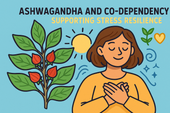
Ashwagandha and Co-Dependency: Supporting Stress Resilience
Stress is more than a feeling—it’s a full-body signal that your system is overwhelmed. When the mind races and the body tenses, your hormones, breathing, and focus all shift into survival mode. Chronic stress doesn’t just affect emotions—it reshapes your nervous system, drains your energy, and clouds your clarity. Learning to understand and manage stress gently is the first step toward peace, balance, and true recovery. 🌿💫
-

Why Co-Dependency Feels Draining: Adrenal Fatigue and Supplements That Help
The adrenal glands are small but powerful organs that sit above your kidneys, acting as your body’s built-in stress managers. They produce hormones like cortisol and adrenaline that help regulate energy, mood, and resilience. When they’re overworked from chronic stress or emotional exhaustion, fatigue and imbalance follow. Supporting adrenal health naturally can help restore calm, energy, and hormonal balance. 🌿⚡
-

The Link Between Anxiety, Co-Dependency, and Natural Support
Anxiety feels like living in constant alert mode—your heart races, your thoughts loop, and your body can’t find peace. It’s the nervous system’s way of preparing for danger, even when none exists. Understanding what’s happening in your mind and body is the first step toward calming the storm and restoring balance. 🌿💫
-

Supplements That Support Dopamine and Serotonin in Co-Dependent Patterns
Serotonin is the neurotransmitter of calm, confidence, and contentment. When it’s balanced, you feel peaceful and emotionally grounded. When it’s low, anxiety, mood swings, and emotional dependence take over. By understanding serotonin’s role in emotional health—and how to support it naturally—you can rebuild inner stability, improve relationships, and cultivate lasting happiness from within. 🌞💫
-

How Emotional Exhaustion in Codependency Impacts the Nervous System
The nervous system is the body’s communication network, connecting the brain to every organ and muscle. It regulates stress, mood, and emotion through a delicate balance of electrical and chemical signals. When overwhelmed, it can become dysregulated—leading to fatigue, anxiety, and emotional imbalance. Understanding how to calm and strengthen the nervous system is key to healing from chronic stress and emotional burnout. ⚡🌿
-

What Is Co-Dependency? The Role of Brain Chemistry and Stress
Stress is more than a feeling—it’s a full-body experience that begins in the brain and ripples through every cell. When cortisol surges and the nervous system stays on alert, your body can’t rest or recover. Over time, this constant tension affects energy, focus, mood, and even immune health. Understanding stress chemistry is the first step toward breaking free from burnout and finding calm again. 🌿
-

Creating a Supplement Stack for Motivation, Energy, and Anti-Procrastination
Motivation is the fuel behind every meaningful achievement—but it’s not just about willpower. It’s a mix of mindset, brain chemistry, and momentum. When energy, focus, and purpose align, action feels natural instead of forced. Learn how to harness motivation as a daily state, not a fleeting feeling.
-

Supplements for Building Consistency and Reducing Chronic Procrastination
Biochemistry is the bridge between biology and chemistry—the science of life at the molecular level. It explains how nutrients, hormones, and neurotransmitters interact to create energy, thought, and emotion. From brain function to muscle movement, biochemistry reveals the invisible processes that sustain health, balance, and vitality.
-

GABA and Procrastination: Supporting Calm Focus for Productivity
GABA is the brain’s natural calming messenger—a neurotransmitter that helps slow mental overactivity and ease stress. When GABA levels drop, focus fades, anxiety rises, and procrastination becomes more likely. By supporting GABA through nutrition, lifestyle, and supplements, you can restore calm clarity, improve focus, and take action with steady, balanced energy.
-

Ashwagandha and Procrastination: Lowering Stress to Improve Action
Science is the language of curiosity and discovery. It helps us understand the hidden patterns behind life, energy, and the universe. Through experimentation and critical thinking, science connects imagination to evidence—turning questions into knowledge. Whether through microscopes, molecules, or minds at work, science represents our endless pursuit of truth and innovation.
-

Neurotransmitters and Motivation: Supplements That Support Drive and Focus
Supplements can do more than boost physical health—they can also enhance mental clarity, focus, and motivation. Nutrients like omega-3s, magnesium, B vitamins, and adaptogens help balance neurotransmitters, stabilize mood, and support brain energy. When combined with good sleep, nutrition, and mindful habits, they can transform how your brain performs under stress.
-

How Stress Hormones Like Cortisol Fuel Procrastination (and What Helps)
Blood sugar isn’t just about physical health—it directly impacts focus, mood, and motivation. When glucose levels spike and crash, energy and attention do the same, fueling procrastination and brain fog. Learning how to stabilize blood sugar through balanced meals, mindful habits, and key nutrients helps keep your mind steady, focused, and ready to act.
-

Brain Fog and Procrastination: Supplements for Mental Clarity
Brain fog can turn even simple tasks into mental hurdles. When your thoughts feel slow and unclear, procrastination often follows—making focus and productivity seem impossible. This article explores the biochemical and lifestyle causes of brain fog and reveals the most effective supplements for restoring mental clarity, focus, and sustained energy.
-

The Link Between Low Energy and Procrastination: Can Supplements Help?
Neurochemistry shapes how we think, feel, and act. When neurotransmitters like dopamine, serotonin, and GABA fall out of balance, it can lead to fatigue, anxiety, or lack of motivation—fueling procrastination and low mood. Understanding the brain’s chemical communication system helps us find ways to restore focus, calm, and emotional stability through nutrition, mindfulness, and targeted supplements.
-

Why Do We Procrastinate? The Role of Dopamine and Supplements That Support It
Dopamine is the brain’s motivation messenger—the chemical that fuels focus, reward, and drive. When dopamine levels drop, even simple tasks can feel impossible to start. This article explores how dopamine shapes procrastination, motivation, and mental energy, along with natural supplements and daily habits that help restore balance and get things done.
-

Phosphatidylserine and Stress Reduction for People with BDD
Stress is more than a mental state—it’s a full-body experience that affects hormones, brain chemistry, and emotional balance. For people with Body Dysmorphic Disorder (BDD), constant tension and worry about appearance can overload the nervous system. Learning how stress works and finding ways to calm it is key to breaking the cycle of anxiety and self-criticism.
-

How Antioxidants Like Vitamin C & E Support Mental Health in BDD
Antioxidants are the body’s natural defense against stress and inflammation. For people with Body Dysmorphic Disorder (BDD), oxidative stress can worsen fatigue, anxiety, and emotional imbalance. Nutrients like Vitamin C and E help protect brain cells, boost neurotransmitter function, and support a calmer, clearer mindset—building a stronger foundation for recovery.
-

Ginkgo Biloba and Memory Support for BDD Recovery
Emotional regulation is the foundation of healing from Body Dysmorphic Disorder (BDD). When the nervous system stays in constant overdrive, even small stressors can trigger self-critical spirals. Learning to calm emotional reactivity helps restore clarity, confidence, and a sense of inner balance. By blending mindfulness, nervous system support, and self-compassion, you can retrain your brain to respond—not react—to emotion.
-

Alpha GPC and Cognitive Function in Body Dysmorphic Disorder
Mental fatigue can feel like your brain has hit a wall—thoughts slow down, focus fades, and motivation disappears. For people with Body Dysmorphic Disorder (BDD), chronic overthinking, emotional stress, and constant self-evaluation can deplete mental energy even further. Understanding what causes this cognitive exhaustion is the first step toward recovery—through rest, balanced nutrition, and targeted brain-supporting supplements.
-

N-Acetyl L-Tyrosine and BDD: Supporting Mental Clarity
Chronic stress doesn’t just affect your mood—it reshapes your brain chemistry, weakens focus, and fuels the obsessive thought loops common in Body Dysmorphic Disorder (BDD). Over time, constant cortisol elevation drains mental energy and emotional balance. Learning to recognize and manage chronic stress is essential to restoring mental clarity, self-compassion, and resilience.
-

Chamomile and Lavender for Calming Obsessive Body Image Thoughts
The nervous system is the command center of our emotional and physical world—and in Body Dysmorphic Disorder (BDD), it often operates in overdrive. Understanding how the brain and body communicate under stress reveals why intrusive thoughts feel uncontrollable. Learning to regulate the nervous system through calm practices, nutrition, and supplements helps restore inner balance and emotional safety.
-

B Vitamins for Stress Resilience in BDD: Rebuilding Calm from Within
Biochemistry is at the heart of every thought, emotion, and reaction we experience. In Body Dysmorphic Disorder (BDD), chemical imbalances in neurotransmitters like serotonin, dopamine, and GABA can amplify stress and distort self-perception. Understanding the biochemistry behind mood and stress regulation offers a path toward healing—bridging the gap between emotional experience and the body’s molecular balance.
-

Melatonin and Body Dysmorphic Disorder: Restoring Healthy Sleep Patterns
Melatonin, the body’s natural sleep hormone, plays a vital role in helping people with Body Dysmorphic Disorder (BDD) restore healthy sleep cycles. When anxiety and obsessive thinking interfere with rest, melatonin levels often drop, leading to more emotional reactivity and distorted self-perception. This article explores how melatonin works, why BDD disrupts it, and how natural supplementation—combined with mindful routines—can help the brain and body finally find calm at night.
-

Sleep Struggles with BDD: Supplements for Rest and Recovery
When you’re living with Body Dysmorphic Disorder (BDD), restful sleep can feel impossible—but the right supplements can help reset your body’s natural rhythm. From magnesium and L-theanine to 5-HTP and ashwagandha, these nutrients support relaxation, lower cortisol, and enhance melatonin production. This article explores how supplements can calm the mind, ease nighttime anxiety, and promote true restorative sleep for emotional and physical recovery.
-

5-HTP and Serotonin Balance: Could It Help with Body Dysmorphic Disorder?
Anxiety can feel like a storm inside the mind—restless, overwhelming, and hard to control. In people with Body Dysmorphic Disorder (BDD), anxiety often fuels obsessive thoughts and self-criticism, creating a painful cycle of worry and self-doubt. This article explores the biological roots of anxiety, the role of neurotransmitters like serotonin and GABA, and how natural strategies such as mindfulness, supplements, and nervous system regulation can restore calm and mental clarity.
-

Can Ashwagandha Help Ease Stress and Anxiety in Body Dysmorphic Disorder?
Neurotransmitters like serotonin, dopamine, GABA, and acetylcholine are the chemical messengers that shape how we think, feel, and react to stress. In Body Dysmorphic Disorder (BDD), imbalances in these neurotransmitters can amplify anxiety, obsessive thinking, and emotional distress. This article explores how restoring healthy brain chemistry through nutrition, supplements, and mindfulness can help bring clarity, calm, and emotional stability.
-

L-Theanine for BDD: Finding Calm in the Mind
Neurochemistry plays a central role in how we think, feel, and see ourselves. For those living with Body Dysmorphic Disorder (BDD), imbalances in neurotransmitters like serotonin, dopamine, and GABA can intensify anxiety, obsessive thoughts, and emotional distress. This article explores how regulating brain chemistry through supplements, mindfulness, and lifestyle changes can bring the nervous system back into harmony and restore inner calm.
-

Omega-3 Fatty Acids and Body Image Disorders: Supporting Emotional Health
Omega-3 fatty acids do far more than support heart health—they nourish the brain, stabilize mood, and may ease the emotional turbulence tied to body image disorders like BDD. This in-depth article explores how omega-3s regulate serotonin, dopamine, and inflammation, helping individuals reduce obsessive thoughts and rebuild self-acceptance. It also connects nutrition to therapy, mindfulness, and nervous system balance for holistic emotional healing.
-

Magnesium and BDD: Calming an Overactive Nervous System
Magnesium plays a crucial role in calming an overactive nervous system—something people with Body Dysmorphic Disorder (BDD) struggle with daily. This article explores how magnesium supports relaxation, emotional regulation, and stress reduction while diving into the science behind its connection to brain chemistry. It also examines how combining magnesium supplementation with therapy and breathwork can help rebalance the body’s stress response, reduce obsessive thought patterns, and promote lasting nervous system calm.
-

The Gut-Brain Axis and BDD: Why Probiotics Might Matter
The gut and brain are constantly in conversation — and that dialogue may shape how you experience Body Dysmorphic Disorder. By nurturing your microbiome with probiotics, prebiotics, and gut-healing nutrients, you can help rebalance serotonin, calm anxiety, and restore emotional stability from within 🧠🦠.
-
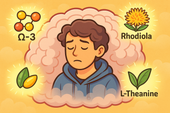
Brain Fog and Body Dysmorphic Disorder: Can Nootropic Supplements Help?
Brain fog often accompanies Body Dysmorphic Disorder, clouding focus and deepening emotional fatigue. Nootropic supplements like L-theanine, Rhodiola, and CoQ10 can help restore mental clarity, balance neurotransmitters, and bring calm energy back to the mind 🌿🧠.
-

How Stress Hormones Like Cortisol May Worsen Body Dysmorphic Disorder
Chronic stress floods the brain with cortisol — the hormone that keeps you on high alert. In Body Dysmorphic Disorder, this chemical overdrive fuels anxiety, distorts self-image, and traps the body in survival mode. Calming cortisol helps restore both peace and perspective 🌿🧠.
-

The Role of Neurotransmitters in BDD—and How Supplements May Help
Neurotransmitters like serotonin, dopamine, glutamate, and GABA shape how people with Body Dysmorphic Disorder perceive themselves. When these brain messengers fall out of balance, perception distorts — but targeted supplements can help restore calm, focus, and emotional regulation 🧠🌿.
-

What Is Body Dysmorphic Disorder? A Deeper Look at the Mind-Body Connection
Body Dysmorphic Disorder (BDD) isn’t just about appearance — it’s about perception. When brain chemistry, trauma, and stress distort self-image, the mind begins to see flaws that aren’t truly there. Healing starts by calming the nervous system and reconnecting mind and body 🪞🧠.
-
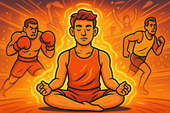
Keeping Calm in Competitive Sports: How to Train Your Mind, Body, and Chemistry for Peak Performance
Competitive pressure can overwhelm even the strongest athletes — but calm is trainable. By combining supplements like magnesium, L-theanine, and adaptogens with breathwork and mindset training, you can stay focused, balanced, and in control under any level of stress 🧠🏅.
-
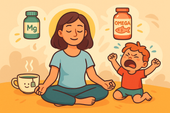
Supplements for Parents Facing Toddler Tantrums: Staying Calm When Little Emotions Run Wild
Toddler tantrums can drain even the most loving parent — but your calm is powerful. With the right supplements like magnesium, L-theanine, and ashwagandha supporting your nervous system, you can stay patient, grounded, and kind, even when emotions run high 🧸🌿.
-

Workplace Stress and Anger Management Support
Workplace stress can quickly turn into frustration — but calm is a skill you can train. By combining supplements like magnesium, L-theanine, and adaptogens with breathwork and mindset tools, you can stay focused, patient, and emotionally grounded no matter how intense the office gets 💼🌿.
-

How to Stay Patient With Family During Stressful Holidays
Holiday gatherings can stir up old stress and test your patience — but calm is possible. With nervous system support from magnesium, L-theanine, and adaptogens, plus mindful breathing and clear boundaries, you can stay centered, kind, and grounded even when family chaos unfolds 🎄💞.
-

Supplements to Keep Calm During Traffic Jams
Getting stuck in traffic doesn’t have to ruin your mood. With calming supplements like magnesium, L-theanine, and ashwagandha, you can train your body to stay relaxed and focused behind the wheel — turning gridlock into a moment of grounded patience 🚗🌿.
-
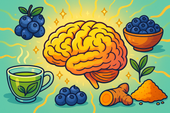
The Role of Antioxidants in Healing Brain Stress from Dissociation
Antioxidants protect the brain from the oxidative stress caused by trauma and dissociation. By neutralizing free radicals and supporting mitochondrial recovery, they help restore clarity, focus, and emotional balance — allowing the mind to heal at the cellular level 🌿🧠.
-
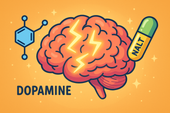
N-Acetyl L-Tyrosine (NALT) for Supporting Mental Clarity
N-Acetyl L-Tyrosine (NALT) fuels dopamine production — the neurotransmitter of focus and motivation. By supporting brain chemistry during stress, NALT helps restore mental clarity, energy, and alertness, making it easier to think clearly and feel present again ⚡🧠.
-

How Ginseng May Improve Focus and Energy in Dissociation
Ginseng helps combat the mental fatigue and fog that often come with dissociation. By supporting mitochondrial energy, balancing neurotransmitters, and regulating cortisol, it gently restores focus, motivation, and emotional presence — helping the mind reconnect with clarity and strength 🌿⚡.
-
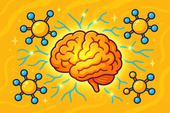
Phosphatidylserine and Dissociation: Supporting Cognitive Function
Phosphatidylserine helps calm the stress response by balancing cortisol, the body’s primary stress hormone. By lowering cortisol spikes, it protects memory, focus, and emotional stability — restoring clarity and mental presence for those struggling with dissociation 🧠🌿.
-
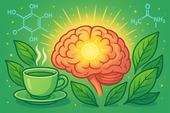
Can Green Tea Extract Help with Dissociative Brain Fog?
Green tea extract may help lift dissociative brain fog by supporting neurotransmitter balance, reducing inflammation, and enhancing energy at the cellular level. With its key compounds EGCG and L-theanine, it promotes calm focus, clarity, and emotional presence — helping you feel more alert and grounded 🍵🧠.
-
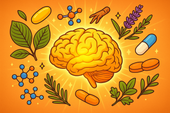
Building a Natural Supplement Stack for Dissociation Support
Building a supplement stack for dissociation means nourishing the brain and body back into communication. By supporting neurotransmitters, gut health, and energy balance through nutrients like magnesium, omega-3s, curcumin, and probiotics, you can help restore clarity, calm, and connection — one layer at a time 🌿🧠.
-

Chamomile and Lavender for Dissociative Anxiety Relief
Chamomile and lavender work together to calm dissociative anxiety by soothing the nervous system and restoring emotional safety. Their natural compounds balance cortisol, enhance GABA activity, and activate the vagus nerve — helping you feel grounded, connected, and at peace again 🌿💜.
-
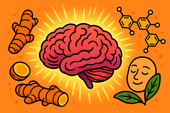
Curcumin for Inflammation and Mental Clarity in Dissociation
Curcumin, the golden compound in turmeric, does more than fight inflammation — it helps clear the mental fog often tied to dissociation. By calming neuroinflammation, balancing neurotransmitters, and supporting mitochondrial energy, curcumin can restore mental clarity, focus, and emotional presence 🌿🧠.
-
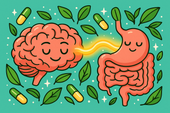
Probiotics and Dissociation: Exploring the Gut–Brain Axis
The gut–brain axis plays a vital role in emotional awareness and presence. When the microbiome is balanced, it supports serotonin production, vagus nerve activity, and calm focus. Probiotics help repair this connection — restoring safety, clarity, and the feeling of truly being in your body again 🌿🧠.
-
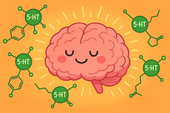
5-HTP for Dissociation: Supporting Serotonin and Emotional Stability
5-HTP helps bridge the gap between emotional numbness and stability by supporting serotonin production — the neurotransmitter that shapes mood, sleep, and sensory awareness. For people experiencing dissociation, 5-HTP may gently restore connection, presence, and emotional balance from the inside out 🌿🧠.

















































